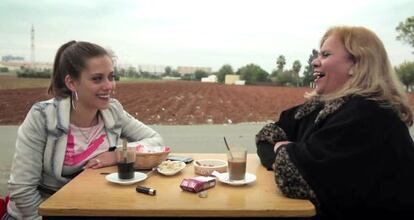An Andalusian flavor at this year's awards
This year marks a historical presence of Andalusian films at the Goyas.


In 1999, Seville-born director Benito Zambrano released Women Alone , the story of a mother and daughter surviving on the breadline. The film was nominated for nine Goyas, eventually taking five. It marked a turning point for the film industry in Andalusia.
On February 17, at this year's Goya awards, another film made in Seville is set to outperform that movie. Unit 7 , by Alberto Rodríguez, has been nominated for 16 awards, among them, Best Film and Best Director.
In total, movies that were made in Andalusia are up for a total of 29 gongs. "Never in the history of the Goyas has there been such a strong Andalusian presence," says Gervasio Iglesias, the producer of Unit 7 . Among the finalists are first-time director Paco León, for Carmina o revienta (or, Carmina or bust), with three nominations; two co-productions made in Andalusia: Los niños salvajes (or, The Wild Children) directed by Patricia Ferreira, nominated in three categories; and Juan de los muertos (or, Juan of the Dead), by Alejandro Brugués, with one nomination; and Malaga-born actor Antonio de la Torre who appears in Unit 7 and Invasor.
"The success of films like Unit 7 is based on their ability to transform a local story into something universal," says Pedro Pérez, the president of the federation of Spanish film producers.
The success of 'Unit 7' lies in its ability to make a local story universal"
"The film is the result of the work of a group of professionals with a long history in the industry. It is a quality film, and perhaps the fact that it deals with corruption, which is on everybody's minds these days, has helped," says its director, Alberto Rodríguez.
May Silva, the head of the Andalusia Audiovisual Foundation, says that this year's bumper crop of candidates from the region reflects the healthy state of filmmaking there. "Unit 7 and Juan of the Dead are works by mature artists and producers with a solid track record. Los niños salvajes and Carmina or revienta belong to a new generation of filmmakers who are well trained and are proving themselves."
Andalusia is also represented on an individual level: Fernando Franco is the favorite to take the Best Film Editor category, while Ramón Salazar is in the running for his adaptation of Tengo ganas de ti (or, I Want You); while José Manuel Serrano has been nominated in the Best Documentary category for Contra el tiempo (or, Against the Clock).
"These nominations show that filmmaking in Andalusia is at a high point," says Javier Paisano, the president of ASECAN, the region's association of screenwriters. He says that in 2012, 10 movies that were made in Andalusia made it to Spanish screens, compared to the usual three.
In Andalusia we have always had talent and we know what we are doing"
Andalusia's current cinematic success is no flash in the pan, and has been built on the work of directors such as Pilar Távora or Víctor Barrera, as well as Benito Zambrano. "This growth should make the government think harder about cutting subsidies," says Pérez.
At the same time, filmmakers from Andalusia know that they are up against an industry that is based in the capital. "Making it to the Goyas is difficult if you don't have a presence in Madrid," says Paisano. "We all know about the way the voting works in the Academy. It will be very difficult to compete against the Catalan lobby. In Andalusia we have always had talent and we know what we are doing. Whether or not we have been rewarded fairly is another matter."
Tu suscripción se está usando en otro dispositivo
¿Quieres añadir otro usuario a tu suscripción?
Si continúas leyendo en este dispositivo, no se podrá leer en el otro.
FlechaTu suscripción se está usando en otro dispositivo y solo puedes acceder a EL PAÍS desde un dispositivo a la vez.
Si quieres compartir tu cuenta, cambia tu suscripción a la modalidad Premium, así podrás añadir otro usuario. Cada uno accederá con su propia cuenta de email, lo que os permitirá personalizar vuestra experiencia en EL PAÍS.
¿Tienes una suscripción de empresa? Accede aquí para contratar más cuentas.
En el caso de no saber quién está usando tu cuenta, te recomendamos cambiar tu contraseña aquí.
Si decides continuar compartiendo tu cuenta, este mensaje se mostrará en tu dispositivo y en el de la otra persona que está usando tu cuenta de forma indefinida, afectando a tu experiencia de lectura. Puedes consultar aquí los términos y condiciones de la suscripción digital.








































